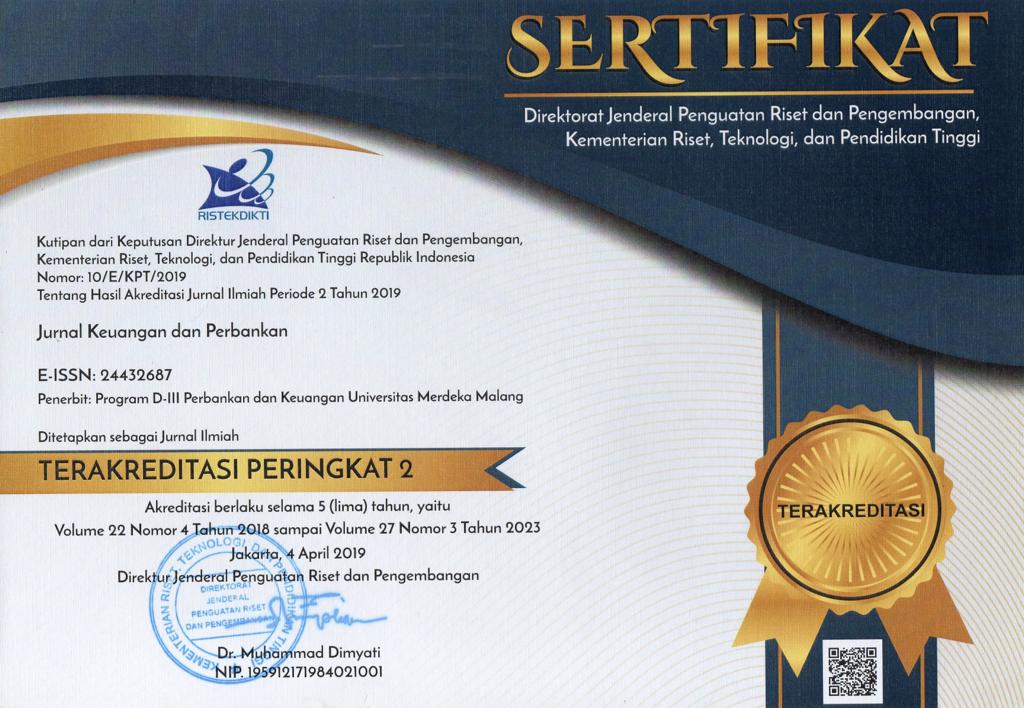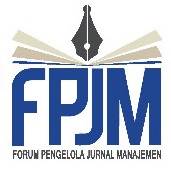Determinants of Profit Sharing Financing and Zakat Distribution Based on CAMEL Analysis
Abstract
The rapid development of Islamic banking has many positive impacts, but on the other hand, the development also demands the readiness of sharia banking in meeting the soundness level standard set by the regulator. This study aimed to integrate the two methods of measurement of Islamic financial institutions, the CAMEL method, and maqasid sharia method. How far the ability of CAMEL, macro and general measurement, in measuring the variables on the maqasid sharia. This research used a panel data model and analyzed four regressions model which welfare model for Sharia Commercial Bank and Sharia Business Unit and affordable product model for Sharia Commercial Bank and Sharia Business Unit. This research used the quantitative descriptive method. We found that only affordable product in Sharia Business Unit can explain independent variable. Other than that, earning component in CAMEL (ROA) had a positive and significant relationship with profit sharing scheme loan. From the results of research conducted, in general, CAMEL and maqasid sharia did not have a relationship except for Sharia Business Unit. This condition can happen because of many things. Among the greater was risked and in terms of better profitability. Therefore, Sharia Commercial Bank and Sharia Business Unit, generally still run a relatively low-risk financing scheme such as Murabaha.
JEL Classification: G31, G32, G34
DOI: https://doi.org/10.26905/jkdp.v22i4.1994
Keywords
Full Text:
PDFReferences
Abdillah, D. (2014). Kinerja Perbankan Syariah Indonesia Ditinjau dari Maqasid Syariah: Pendekatan Syariah Maqasid Index (SMI) dan Profitabilitas. Skripsi. Universitas Islam Negeri Sunan Kalijaga. https://doi.org/10.1017/CBO9781107415324.004
Adzhani, R., & Rini. (2017). Komparasi kinerja perbankan syariah di Asia dengan pendekatan maqasid syariah. Jurnal Akuntansi dan Keuangan Islam, 5(1), 5–30. Retrieved from: https://jurnal.sebi.ac.id/index.php/jaki/article/view/73/62
Afrinaldi. (2014). Analisa kinerja perbankan syariah Indonesia ditinjau dari maqasid syariah: Pendekatan syariah maqasid index (SMI) dan profitabilitas bank syariah. Islamic Economic & Finance (IEF) Universitas Trisakti, 24(1), 24–52.
Antonio, M. S., Sanrego, Y. D., & Taufiq, M. (2012). An analysis of Islamic banking performance: Maqashid index implementation in Indonesia and Jordania. Journal of Islamic Finance, 1(1), 12–29.
Bank Indonesia. (2007). Surat Edaran No.9/24/DPbS Perihal: Sistem Penilaian Tingkat Kesehatan Bank Umum Berdasarkan Prinsip Syariah. 53(9), 1689–1699. https://doi.org/10.1017/CBO9781107415324.004
Basher, S. A., Kessler, L. M., & Munkin, M. K. (2017). Bank capital and portfolio risk among Islamic banks. Review of Financial Economics, 34, 1-9. https://doi.org/10.1016/j.rfe.2017.03.004
Bougatef, K., & Korbi, F. (2018). The determinants of intermediation margins in Islamic and conventional banks. Managerial Finance, 44(6), 704–721. https://doi.org/10.1108/MF-11-2016-0327
Chapra, U. (2011). Visi Islam dalam Pembangunan Ekonomi: Menurut Maqasid Asy-Syariah. P. I. A. Basri, Edition. Solo: Al–Hambra.
Dusuki, A. W., & Abdullah, N. I. (2015). Maqasid al-shari’ah, maslahah, and corporate social responsibility. The American Journal of Islamic Social Sciences, 24(1), 25-45. http://www.sims.edu/wp-content/uploads/2015/04/JIDNYASA.pdf
Erol, C., Baklaci, H. F., Aydoğan, B., & Tunç, G. (2014). Performance comparison of Islamic (participation) banks and commercial banks in Turkish banking sector. EuroMed Journal of Business, 9(2), 114–128. https://doi.org/10.1108/EMJB-05-2013-0024
Hamza, H. (2015). Does investment deposit return in Islamic banks reflect PLS principle? Borsa Istanbul Review, 16(1), 32-42. https://doi.org/10.1016/j.bir.2015.12.001
Mejia, A. L., Aljabrin, S., Awad, R., Norat, M., & Song, I. (2014). Regulation and supervision of Islamic banks. IMF Working Papers, 1-33. https://doi.org/10.1057/jbr.2012.3
Minhat, M., & Dzolkarnaini, N. (2016). Islamic corporate financing: Does it promote profit and loss sharing? Business Ethics, 25(4), 482–497. https://doi.org/10.1111/beer.12120
Mohammed, M. O., & Razak, D. A. (2008). The performance measures of Islamic banking based on the maqasid framework. IIUM International Accounting Conference (INTAC IV), 1–17.
Mohammed, M. O., Tarique, K., & Islam, R. (2015). Measuring the performance of Islamic banks using maqāṣid -based model. Intellectual Discourse, 4878(SI), 401–424.
Pradesyah, R. (2017). Analisis pengaruh non performing loan, dana pihak ketiga, terhadap pembiayaan akad mudaraba di bank syariah. Jurnal Agama dan Pendidikan Islam Intiqad, 9(1), 93-111.
Ratnaputri, W. (2013). The analysis of Islamic bank financial performance by using CAMEL and shariah conformity and profitability. Jurnal Dinamika Manajemen, 4(2), 220–232.
Rusydiana, A. S., & Parisi, S. Al. (2016). The measurement of Islamic bank performance: A study using maqasid index and profitability. Global Review of Islamic Economics and Business, 4(1), 1–14.
Sarker, A. A. (2006). CAMELS rating system in the context of Islamic banking: A proposed “S” for shariah framework. Journal of Islamic Economics, Banking, and Finance, 2(2), 1–26.
Sutrisno. (2017). Pengukuran Kesehatan bank syariah dengan sharia compliance and performance. Jurnal Keuangan dan Perbankan, 21(40), 133–143.
Triyuwono, I. (2011). ANGELS: Sistem Penilaian tingkat kesehatan (TKS) bank syari’ah. Jurnal Akuntansi Multiparadigma, 2(1), 1-21.
Yudaruddin, R. (2017). The global economic crisis and its impact on Indonesia’s education. Jurnal Keuangan dan Perbankan, 21(4), 621–629.
Yulianto, A., & Solikhah, B. (2016). Investigate the influence factors of mudharaba financing to strengthen the core business of Islamic banking. International Journal of Applied Business and Economic Research, 14(5), 3025–3034.
DOI: https://doi.org/10.26905/jkdp.v22i4.1994
Refbacks
- There are currently no refbacks.
Jurnal Keuangan dan Perbankan (Journal of Finance and Banking)
Diploma Program of Banking and Finance, Faculty of Economics and Business, University of Merdeka Malang
Published by University of Merdeka Malang
Mailing Address:
2nd floor Finance and Banking Building, Jl. Terusan Raya Dieng No. 57 Malang, East Java, Indonesia
Phone: +62 813-3180-1534
Email: jkp@unmer.ac.id
 This work is licensed under a Creative
This work is licensed under a Creative
Commons Attribution-ShareAlike 4.0




